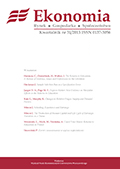An analysis of technical factor returns on the Warsaw Stock Exchange, 1999–2009
W. Grabowski, K. Rotuski, K. Skrzypczak
ABSTRACT:
Full text (PDF)
Issue number: 26
In this issue:
Mechanizm upadku socjalistycznego systemu gospodarczego
M. Taguchi
ABSTRACT |
PDF
This article presents the model of functioning of the socialist economic system based on empirical analysis of the Polish reforms. In Poland, there were several trials to carry out economic reforms, but always after a few years they were stopped. Therefore I will examine why the reforms failed, and why the system reforms ultimately stalled in deadlock.
I focused on the basic architecture of the “traditional” system, the cyclical nature of the structural reform of the socialist political determinants of economic reforms, interoperability and interactivity between platform and mechanism of its functioning. According to the analysis, even if the mechanism of functioning of the economic system will be improved, but will not be matched to the basic architecture, sooner or later, the operation mechanism will operate imperfectly, and it will return to the originalmechanism functioning at the level of the basic architecture of the traditional system. This rigid platform creates the periodicity of the economic reform. Thus, the system does not function efficiently if the platform is replaced. However, the basic architecture of the platform is the ideological foundation of the socialist system as well and bringing it to change is the negation of socialism. These are the fundamental limitations of the economic reforms in the socialist system.
This lack of flexibility led to the collapse of the system and inevitably leads to the system transformation.
The Misalignment of the Real Exchange Rate with the Fundamentals: Evidence from the Czech Republic, Hungary and Poland
V. Posta
ABSTRACT |
PDF
The paper examines the behavior of the real exchange rates in the Czech Republic, Hungary and Poland, analyzing its driving forces with the emphasis on the turbulences which have been lately seen in the economies. Real equilibrium exchange rates are estimated using the BEER methodology to serve as a benchmark to which the real exchange rates are compared. The gap between the estimated real equilibrium exchange rates and real exchange rates as well as the key determinants of the real equilibrium exchange rates are analyzed and compared in the three cases. While the Czech Republic and Poland have been relatively mildly hit by the current crisis which has been accompanied by a relatively acceptable misalignment of the real exchange rate with the fundamentals, clear long-run divergence of Hungarian real exchange rate from the market fundamentals has been detected in the analysis.
Skuteczne strategie segmentacyjne - w kierunku ograniczenia ryzyka utraty klienta zamożnego
K. Opolski, T. Potocki, T. Świst
ABSTRACT |
PDF
The article presents how the changes on the financial markets influence the choice of the appropriate segmentation strategy, how they support a personalized approach to the customer, and the accurate estimate of the customer’s financial capacity and to build lasting relationships with customers.
The authors suggest the special importance of this process in the Wealth Management segment, where it becomes a key factor in the battle for the customer, and mitigation of the risk of losing the customer. In addition, the authors discuss and give arguments that the individualization of needs, preferences or behavior is not possible for each client individually, but through an effective design of the process of segmentation the bank is able to reduce the risk of missed sales activities by constructing groups of similar set of the analyzed components. In conclusion, attention is drawn to two very important, from the point of view of the segmentation, areas of the segmentation analysis. First, preparing and building new customer segmentation strategies Wealth Management, do not forget the cultural diversity of the regions of the world. Secondly—the emerging EU Directives on Basel II, MiFID and the Prevention ofMoney Laundering make that the way of the customer segmentation must be consistent with the construction law facing the EU directives for the local regulators.
Stosowanie ulg i zwolnień w podatku dochodowym od osób fizycznych w państwach UE
A. Ślesicka
ABSTRACT |
PDF
In the absence of harmonisation of personal income tax within the European Union, theMember States are free to choose the tax systems that they consider most appropriate. Therefore, each country uses different forms of reducing the overall tax burden of labour in order to achieve desirable social or economic results. The aim of this article is to present the diversity of tax reductions exerted by theMember States with special regard to their different effect on tax amount. It also discusses most popular tax allowances applied in the Member States with detailed glance on child allowance. Furthermore, it presents tax exemptions with division into three main categories and gives examples of them applied in selectedMember States. The last part of this article analyzes tax allowances and tax exemptions in Poland in the period of 2000–2007.
Kwestia definicji dóbr publicznych
E. Rutkowska
ABSTRACT |
PDF
"The theory of economy deals mainly with private goods […] Nevertheless, there are many goods which do not fall into this category" (Wilkin, 2005, p. 159). This is the reason that makes a few Polish authors interest in the theory of public goods; but, before being able to enlighten the theory, one should begin with a strong basis which is the definition; hence the idea of the article. Threemain parts are shown here, starting from Paul A. Samuelson and his pure public good understanding followed with a word of its critics. As one of counterarguments to Samuelson's definition, Richard A. Musgrave's public good impurity examples are recalled. Then we continue with an abstract understanding of public good by James M. Buchanan. His idea is to call every item of public good, my public good. Hence if two people stand under the same street lamp at the same time, each of them consumes different unit of public good. Even if the way of thinking may seem to be odd, it eliminates a few significant obstacles with which Samuelson's theory could not manage. What is more, it enables its author to create the whole system of public goods' distribution, but it is a subject for another article.
Proces podejmowania decyzji kredytowej (na przykładzie ofert wybranych banków detalicznych)
J. Wróblewska
ABSTRACT |
PDF
The article deals with the factors influencing decisions and the consumer behavior in themarket for consumer loans. It appoints the differences in the perception of credit costs in terms of economics and behavior. Its main objective is to determine how important are the nominal interest rate, total cost and the amount of monthly payment in the process of choosing a particular loan offer. Based on the conjoint analysis, conducted on a group of 105 adult Poles, who declared the contact with any form of credit, the author of the article proves the hypothesis that borrowers perceive the cost of borrowing under the assumptions of mental accounting. It also answers many research questions related to individual differences in the perception of credit costs and the relationship between declared attitudes toward borrowing and accounting of mental and materiality of the analyzed characteristics of the loan.
Ewolucja polityki społecznej we Wspólnocie Europejskiej
M. Małkowski
ABSTRACT |
PDF
This article describes the evolution of the European social policy since the Rome treaty of 1957 to date. It thoroughly covers the history of EU's social programs, as well as the institutional structure. The main goals of European policy makers are also mentioned. The article concludes with a brief description of themain challenges of the enlarged European Union, focusing on the future of the European social model.
Autoselekcja w internetowym eksperymencie Keynesian p-Beauty Contest
T. Kopczewski
ABSTRACT |
PDF
Keynesian p-Beauty Contest (KpBC) is one of the most commonly used laboratory experiments to study the degree of rationality of people and the learning process. It is also applicable in education as a tool to illustrate both the concept of rationality and iterative elimination of dominated strategies. The aim of this paper is to present the results of online teaching experiments in which an auto-selection mechanism has been used based on the existing social stereotypes. The repeatability of the results shows that the experiments are resistant to the distortions arising from the use of the online environment, and that a developed methodology allows to carry out reliable experimental studies.

